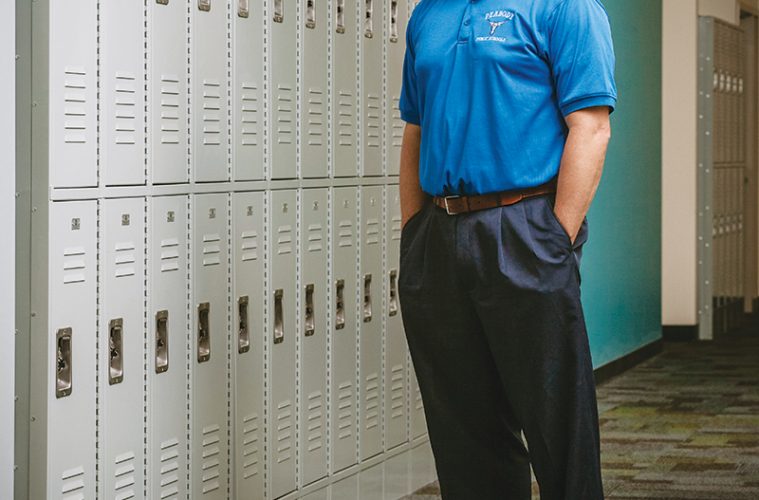In many ways, it was a typical high school graduation scene. Smiling teenagers in gowns and mortarboards snapped selfies and posed for family photos before the ceremony. Proud parents held bouquets of flowers and shouted words of encouragement as their children walked across the stage. Scholarships were awarded, and a keynote speaker offered words of advice.
What made the Peabody Learning Academy’s graduation last June a bit different, however, was the setting. Instead of an auditorium or a gym, this class of 15 students celebrated their successful completion of high school in the same place they had attended classes: the Northshore Mall.
“We have some people who come to the mall to get a cup of coffee or to shop at Macy’s, but you came for an entirely different reason: to get a high school education,” mall manager Mark Whiting told the assembled students and their families.
Founded in 2010, the Peabody Learning Academy (PLA) is an alternative program for Peabody students who just aren’t comfortable in a traditional high school setting. The Academy is one of 22 such programs across the country sponsored by the Simon Youth Foundation, the charitable arm of mall-management company Simon Property Group. Like PLA, most of these academies are situated within malls.
These programs were born from the basic observation that at-risk students—the ones skipping school and neglecting their homework—are often found at the mall instead of poring over books, explains J. Michael Durnil, president and CEO of the foundation. It just made sense, therefore, to try to reach these students in a place where they are already comfortable—emotionally, physically, and socially.
The Academy serves students who have attended Peabody High School for at least a year. They are often referred by teachers and administrators, though parents occasionally seek out the school on their own.
Students may have learning impediments or health issues. They may have experienced the loss of a parent. Or they may feel like they just don’t fit in. “You name the type of adversity a teenager could face, and we’ve really dealt with it here,” says academy director Seith Bedard. “The education part of what we do here is minor compared to all the other things we do with these kids.”
PLA’s approach to learning is a unique combination of fostering independence and enforcing boot camp-like discipline. Attendance is expected every day; when students don’t appear, Bedard has been known to show up at their houses and drive them to school himself—he’s gone as far as Dorchester to retrieve an errant student. Students take online classes at their own pace, with teachers—each certified in multiple disciplines—who are there to help them understand the material and keep them on task. “We really dive in individually with each kid,” says Bedard, “[to] make sure they are learning what they should learn. We’re able to focus on areas of weakness with students and build on strengths.”
Alongside academics, students do community service activities like writing letters to deployed troops, reading to elementary school students, and volunteering in food pantries. Representatives from the local Workforce Investment Board help the students polish their resumés and hone their job search skills. The school’s connections with the mall have helped students get jobs at Burtons Grill and the Cheesecake Factory.
The school also works with area colleges, like North Shore Community College and Endicott College, to help students learn about and apply for higher education options. During this year’s commencement ceremony, nearly $100,000 in scholarship funds was awarded to the graduates.
The approach is yielding results. Seven years ago, the dropout rate in Peabody was 4.3 percent, according to state numbers. Last year, it was down to 1.1 percent, the lowest in the town’s history, according to Bedard. Since the school was launched, 81 students have graduated and more than 50 have gone on to pursue two- or four-year college degrees.
Parents and students alike are thrilled with the Academy. Beth Denish was afraid her son, Dylan, was going to end up dropping out before he found PLA. The personal attention Bedard and the Academy teachers provide, however, turned him around, she said, as she waited to watch him graduate. “At the high school, he just got lost. At this school, it’s like, ‘We’re going to treat you like an adult, so act like it.’”
In keeping with the PLA’s emphasis on the individual, each student is invited to the microphone at graduation to say a few words about their journey or their future plans. Almost unfailingly, they thank the PLA staff. “I can’t thank them enough for letting me know I wasn’t just another statistic,” said student Alexia Rivera at this year’s ceremony.
Now that the Academy has proven itself, it is planning for the future. The hope is to add 25 percent to the 4,000-square-foot space and increase its capacity from 30 to 45 students. For his part, Bedard looks forward to helping even more teenagers find their place and get a taste of success. “To see where these kids came from and where they’re going, it’s unlike anything else,” he says. “It’s really remarkable what these kids have been able to do.”

